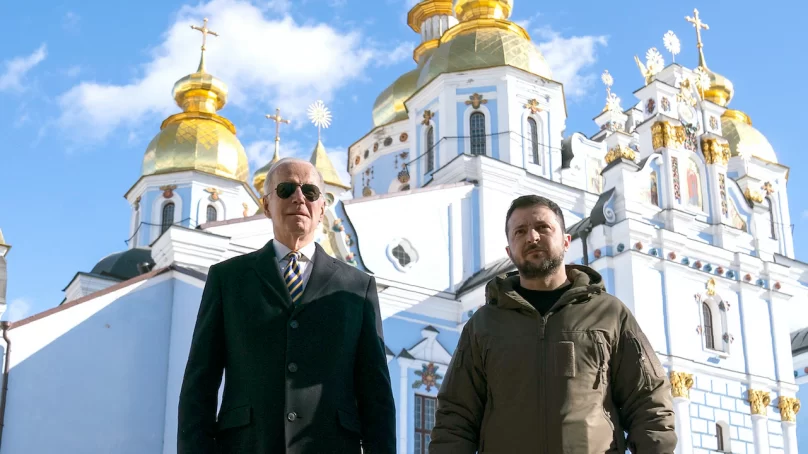
One of the most striking aspects about the past year is how little debate we’ve seen over US and Nato policy on Russian-Ukraine war.
This is not to say that there is only one right position on Ukraine. Nor does it mean that there are not some deranged people who are actively cheering on Russian President Vladimir Putin as he wages an illegitimate and heinous war. But one of the most striking aspects about the past year is how little debate we’ve seen over US and Nato policy.
The role of Western powers in the war in Ukraine will have far-reaching consequences for global security and relations among nations. It will impact the stability of the US economy and is setting precedents that will have repercussions, including on matters of international law.
It also will legitimise a new set of norms permitting proxy warfare and will encourage malign actors to use the “Ukraine principle” to their advantage.
It is unfortunate that the most prominent political critique of US policy in Ukraine from official quarters emanates from a handful of congressional Republicans whose dominant rationale for their position is a rancid potpourri of “America First” principles and warped Trumpist ideology.
At its best, some Republican opposition is rooted in a libertarian anti-interventionism. Overwhelmingly, US liberals, neoconservatives, and old-school Republicans have fallen into line with the Biden administration policy. Even the mildest effort at dissent in Congress has been ridiculed and calls for a negotiated end to the war retracted.
Standing alongside Zelenskyy on his recent trip to Kyiv, Biden celebrated the massive scope of military support from the US and its Nato allies, declaring “that’s how long we’re going to be with you, Mr President: for as long as it takes.” Biden announced new rounds of support to Kyiv on top of the more than $30 billion given to date in weapons and other military aid.
After a series of “war games” with Ukrainian military officials this week at a US base in Germany, Nato’s supreme allied commander for Europe, Gen Christopher Cavoli, said the US and Nato “can keep going as long as necessary.” Such open-ended commitments from US officials are bolstered by a recent shift in US defence spending and procurement authorities reminiscent of the Cold War.
During her trip to Ukraine soon after Biden’s, Treasury Secretary Janet Yellen asserted that US support for Ukraine “is motivated, first and foremost, by a moral duty to come to the aid of a people under attack.”
American officials should not be able to utter such phrases without answering for why this supposed moral duty does not apply to the Palestinians or why this moral duty somehow disappears when the US wages offensive wars or supports its allies in their own campaigns of mass slaughter.
The argument over whether the US and Nato should be giving military aid is a trap because it’s presented as a binary choice.
Let there be no doubt: Putin should immediately stop this insanity in Ukraine. This is a gruesome and murderous campaign he’s engaged in, and the death toll is shocking. The Biden administration should do what we are constantly told is untenable, unrealistic, or characterized as appeasement: make a negotiated end to the war the top priority.
China has recently indicated a greater willingness to play a direct role. This is an opportunity for a major reset among nations. But that won’t happen because we lack leaders in the US who have such bold vision, leaders willing to shift from the dominant imperial posture. So we are stuck with the current prospect of countless more Ukrainian civilians dying. In the face of that, how does one tell the Ukrainians not to fight?
How does one say, “No, we won’t give you weapons, but we also are against what the aggressor is doing”? It’s a reasonable position for people watching this bloodbath to want to do everything possible to help Ukrainians defend themselves, and supporting weapons transfers to Ukraine does not make you a pawn of the US imperial state. But the argument over whether the US and Nato should be giving military aid is a trap because it’s presented as a binary choice. What has our government done to seek alternative paths? Has it exhausted all diplomatic efforts?
Many of the supporters of Nato policy in Ukraine act as if Zelenskyy’s wishes and requests should govern the decisions of the US and European nations. This is dangerous. At times, Biden has rightly pumped the brakes on sending sophisticated or high-powered weapons systems, only to later relent under pressure. Momentum is now building in Congress and among some influential liberal media voices to push Biden to authorise the transfer of F-16 fighter jets.
A similar campaign has been waged to give Ukraine top-tier US weaponized drones. The consequences of these decisions will impact the whole world, and people not only have a right to debate the policy, but they are also right to do so.
Questioning the current US policy is not appeasement or Russian puppetry, particularly because the false choice – let Putin conquer Ukraine completely or flood Ukraine with Western weapons – is so insidiously and dishonestly pushed by the elite power structure in Washington DC and Europe.
The fact is that prominent US officials and pundits have stated from the very early stages of this war that Ukraine is a convenient battleground to debilitate Russia and hopefully end Putin’s reign, which is very different from a “moral” duty to protect the defenceless.
- The Intercept report











